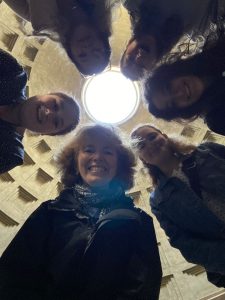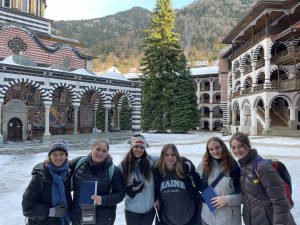Professor Mimi Killinger is a Professor of Honors at the University of Maine in Orono. There, she leads engaging interdisciplinary seminars that explore literature, philosophy, art, and science in a close-knit learning environment. Her research dives deep into 20th century American history, particularly focusing on the experiences of women. Most recently, her work has explored the groundbreaking 1970s women’s art collectives in both the United States and New Zealand.
She brought her teaching experience from the American University in Bulgaria, where she led courses on “Reading American Landscapes: History & Local Context” and “A Bulgarian Cultural Odyssey.”
I am a Professor of Honors at the University of Maine in Orono, where I teach interdisciplinary, small seminars on literature, philosophy, art and science. My research focuses on 20th century American history, with particular emphasis upon women’s history. Most recently, I have been writing about 1970s women’s art collectives in America and New Zealand.
I taught 2 courses at AUBG: HTY 2100 Reading American Landscapes: History & Local Context and HTY 2101 A Bulgarian Cultural Odyssey.
AUBG Exchange
I had long wanted to create a travel-study experience for a group of UMaine Honors students. Since its inception in 1991, AUBG has been a partner institution of the University of Maine with lots of wonderful students from Bulgaria coming to our UMaine campus. Those exchange students inspired me to consider Bulgaria for a travel-study experience, as did our fantastic Director of International Programs at UMaine, Orlina Boteva, who is an AUBG graduate and was herself an exchange student to UMaine back in the nineties.
Diverse Experience
I thoroughly enjoyed both classes. HTY 2100 Landscapes was a small seminar which included the 5 UMaine exchange students and 2 AUBG students, all of whom were terrific. That course included a number of “explorations” such as a trip to the beautiful Rila Monastery, the Erasmus group bus trip to Thessaloniki and local adventures to the Blagoevgrad Varosha Quarter, the history museum, the clock tower and the zoo.
I was extremely grateful for the diverse perspectives students brought to our discussions. It was fascinating to hear their personal reflections on landscapes of rural Maine, coastal Maine, urban Maine, Albania and Bulgaria – all so different and interesting.
Campus Life
In HTY 2101 A Bulgarian Cultural Odyssey – a small seminar with just the 5 UMaine students – we explored a range of cultural opportunities like the AUBG production of Drowning Ophelia, the Panitza Library Don Quixote exhibit, the AUBG Dance and Taste Fest, the Blagoevgrad City Gallery and even ventured off on a weekend trip to incredible Rome.

UMaine Study Abroad group at AUBG on a trip to Rome
Takeaways
Study Abroad experiences are wonderful for faculty, too! I felt so fortunate to befriend new colleagues at AUBG, to experience life on an international university campus, to live in Blagoevgrad, to explore Bulgaria and beyond. It was a remarkable, transformative education for me, as well.
The Balkans
Studying history in the Balkans was an astonishingly rich and complex experience. I found myself overwhelmed at times by the numerous opportunities to learn and explore. Beautiful Plovdiv was a highlight, as was Varna with its archeology museum and incredible Istanbul with its mosques and vast history. I also had a fantastic ski day at Bansko in the gorgeous Pirin Mountains.

UMaine Study Abroad group at AUBG on a walk in Blagoevgrad
Piece of Advice
to fellow professors
Please come to Maine! I hope there will be more exchange opportunities between AUBG and UMaine, and it would be wonderful to have an AUBG faculty member teach in our Honors College for a semester someday.
to the students
Enjoy the remarkable AUBG international community. One of my UMaine students noted that, prior to AUBG, she had thought of countries as political entities. Now she thinks of countries as people. What a beautiful education!





